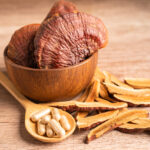Medicinal mushroom extracts target breast cancer cells, new research suggests
 (NaturalHealth365) While survival rates for breast cancer have appeared to improve over recent years, the disease still takes a deadly toll. In fact, according to Western medical sources, over 42,000 women lost their battle with breast cancer, as of the latest reports. Fortunately, there are many researchers looking to discover new, non-toxic methods of addressing cancer such as the value of consuming medicinal mushrooms.
(NaturalHealth365) While survival rates for breast cancer have appeared to improve over recent years, the disease still takes a deadly toll. In fact, according to Western medical sources, over 42,000 women lost their battle with breast cancer, as of the latest reports. Fortunately, there are many researchers looking to discover new, non-toxic methods of addressing cancer such as the value of consuming medicinal mushrooms.
Cherished in traditional Chinese medicine (TCM) for thousands of years as an herbal strategy to promote health and longevity, these intriguing edible fungi are packed with bioactive compounds. In a 2023 review published in the International Journal of Molecular Science, the authors examined an array of clinical, animal, and cell studies to determine the effects of medicinal mushrooms on breast cancer. Let’s see how medicinal mushrooms may help to offer a “first line of defense” against a deadly disease.
Multiple scientific reviews confirm the anticancer potential of medicinal mushrooms
The review authors credited medicinal mushrooms with a wide range of effects, including antibacterial, anti-inflammatory, antioxidant, and antiviral abilities. In addition, they reported that several varieties of mushrooms – including turkey tail, reishi, and shiitake – appear to have immune system-boosting properties, demonstrated by increasing B- and T-cell counts and boosting the activity and number of innate immune cells. In addition to empowering the body’s natural defenses against cancer, medicinal mushrooms may help to alleviate the toxic effects of chemotherapy and radiation.
The new review is not the only research highlighting medicinal mushrooms’ anticancer effects. In a review published in Nutrients the same year, the authors noted that medicinal mushrooms’ content of polysaccharides and triterpenoids allows them to combat cancer cells in multiple ways – including inhibiting cell proliferation and invasiveness, helping to reverse multidrug resistance and regulating immune function. The authors concluded that medicinal mushrooms have “substantial potential in the prevention and treatment of cancer.”
The U.S. lags behind? Medicinal mushrooms are already accepted as a form of cancer therapy in Japan and China
Botanically known as Coriolus versicolor, turkey tail mushroom features tan and gray stripes at the fungi’s edges – hence, its colorful name. Used as a “magic herb” in traditional Chinese medicine to support well-being and longevity, turkey tail has for decades been approved in both China and Japan for use in cancer therapy as well.
According to researchers, polysaccharides and glycoproteins in these therapeutic mushrooms can activate natural killer cells and boost the immune system. Turkey tail mushrooms are believed to enhance the infiltration of T-cells into tumors, inhibit the invasiveness and migration of breast cancer cells, and help reduce the chronic inflammation that can trigger cancer.
Reishi is cherished as the “mushroom of immortality”
The reishi mushroom, botanically known as Ganoderma lucidum and also called “Ling-zhi,” is one of the most widely used mushrooms in the world. Utilized by Chinese Taoist monks to promote calm and serenity, reishi is held in such high regard in traditional Chinese medicine that it is referred to as the “mushroom of immortality.”
Reishi compounds, such as beta-glucans and triterpenes, have been shown to induce apoptosis and cell cycle arrest in breast cancer cells, thereby decreasing the ability of cancer cells to invade and migrate. While more clinical studies are needed, reishi extracts have aroused interest in researchers for their ability to reduce mammary tumors in animals. Reishi mushrooms are believed to be chemopreventive, meaning that they may help prevent breast cancer from developing in the first place.
Shiitake mushrooms inhibit multiple pathways needed for the spread of cancer cells
Shiitake mushrooms are a highly palatable, nutritious, and popular food rich in B vitamins and featuring a meaty, pleasant taste. But these versatile mushrooms have even more to offer.
Botanically known as Lentinula edodes, the shiitake mushroom has a reputation as the “elixir of life” dating back to the Ming dynasty. Due to its various phenolic compounds – and a potent antioxidant known as ergothioneine – shiitake has a reputation for lowering cholesterol levels, regulating blood pressure, and decreasing inflammatory markers. Even more impressive is the reishi mushroom’s ability to reduce tumor size – courtesy of its secret weapon, a polysaccharide known as lentinan. Lentinan can damage the mitochondrial membranes of cancer cells, causing apoptosis and cell death. Notably, reishi mushroom extracts have been found to reduce the migration of breast cancer cells without damaging normal healthy cells.
Update: In research hailed as “groundbreaking,” a new study conducted at Shinshu University in Japan and published in the journal Heliyon identifies a previously unknown antioxidant – inaoside A – found in Laetiporus cremeiporus, an eastern Asian edible mushroom. “We are the first to uncover the isolation of an antioxidant compound from L. cremiaporus,” the researchers declared. The team remarked that the discovery illustrates new potential for mushrooms to be used as a source of therapeutic bioactive compounds.
The “elixir of life.” The “mushroom of immortality.” The “magic herb.” Maybe it’s no accident that these powerful medicinal mushrooms are referenced in such glowing terms. After all, emerging research shows that these edible fungi are uniquely positioned to play a major role in combating one of our most dreaded diseases.
Maybe it’s time to speak with your holistic healthcare provider about whether medicinal mushrooms are right for you.
Sources for this article include:



